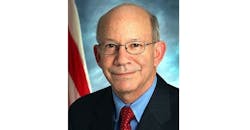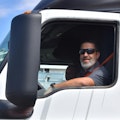US Rep DeFazio fording partisan waters to fight for much-needed improvements in surface transportation
IN a political environment increasingly divided along party lines, Rep. Peter DeFazio, a Democrat from Oregon, believes he can be a unifying force between Congressional Democrats and the Trump administration.
That appears increasingly unlikely after President Donald Trump walked out of a meeting on infrastructure with Democratic leaders Wednesday, May 22, upset over House Speaker Nancy Pelosi’s accusation of a “cover-up,” and ongoing investigations Trump says prevent the two sides from working together.
But DeFazio, who chairs the House of Representatives Transportation & Infrastructure Committee, assured attendees of the National Tank Truck Carriers’ 71st Annual Conference & Exhibits in April in Las Vegas, Nevada, he’s committed to improving the country’s surface transportation—and doesn’t particularly care for partisan politics.
“We’re really at a critical point with our nation’s infrastructure,” DeFazio said.
“Unfortunately, we’ve gotten in this very partisan atmosphere where everybody’s looking for an advantage over the other party and it seems to be more about the next election than about the country, which I’m not very patient with, to tell the truth.”
Failing familiarity
DeFazio started by pointing out that fleet drivers are, at times, too familiar with our aging national highway system, which he said includes 47,000 bridges that need to be replaced or substantially repaired, and another 235,000 that “need work.” In all, 40% of the system is deteriorated to where it can’t be resurfaced, he said.
The bad news is efforts to improve US infrastructure will be expensive, costing as much as $1 trillion over 10 years for surface transportation alone. The good news, he maintained, is the investment has an undeniably positive rate of return, ultimately making the US more efficient and competitive in the world economy.
So why aren’t we moving forward? Partisan politics and lack of funding.
DeFazio said his committee is the “least partisan in Congress” and praised the efforts of Democrats and Republicans who came together to pass the FAST Act in 2015. However, the FAST Act did not address revenue, which he said isn’t part of his committee’s jurisdiction, or increase user fees for gasoline and diesel for the first time since 1993.
And with annual spending on surface transportation authorized by the FAST Act and transferred to the Highway Trust Fund set to decrease by $17 billion Oct. 1, 2020, neither side can afford to kick the can down the road, DeFazio said.
“That’s how inadequate are the current sources of revenue that are flowing into surface transportation,” he said. “We’re borrowing $17 billion a year to put into the trust fund. Now, I can justify borrowing for capital investment. We don’t have capital budgets unfortunately. But that’s what you’re talking about.
“If we can build a bridge that’s going to last 100 years, why should we say that’s a one-year expenditure? Why should that count as the same as burning fuel in the federal fleet? It does, and it doesn’t make sense, so we’re battling ourselves with these budget rules and everything else, and we’ve got to get past that.”
Infrastructure now
DeFazio is in favor of gas and diesel tax increases, which he sees as a more viable means of funding the Highway Trust Fund than miles-traveled methods. He said 28 states already have raised gas/diesel taxes, many of them red.
“I say to my colleagues there are not going to be political consequences if you vote to raise the user fees,” he said. “We’ve got the trucking industry with us, we’ve got the US Chamber of Commerce with us, we’ve got the American Automobile Association … but we’ve been stuck, and I’m hopeful this is the time to get there.”
DeFazio said he met with Trump last year to discuss revenue but the only thing that came of their discussions was a transportation plan he said was written for Trump by someone who was “ideologically oriented” and went nowhere. The plan was based on “asset recycling,” included no user fee and actually decreased federal matching from 80% to 20%—and even Trump said he didn’t support it, according to DeFazio.
Still, DeFazio believes they can effectively fund infrastructure improvements, and do so more swiftly than a current U.S. Chamber of Commerce proposal that calls for 5-cent increases in user fees over the next five years, if they leverage gas and diesel tax increases with bonds that provide money for repairs up front.
“We need to bond,” DeFazio said. “I proposed this to Ray LaHood, way back when he was secretary of transportation, and he loved the idea. Index the gas and diesel tax, project the income and issue bonds every year that are based on that future income.”
He said he would cap increases at 1.5 cents a gallon per year, with no exceptions, and issue $33 billion in bonds every year for 15 years, which would allow the country to improve infrastructure to where it “minimally needs to be.”
Of course, the viability of any funding plan hinges on the president’s support, which appears less forthcoming after the failed May 22 meeting. DeFazio, however, was optimistic only three weeks earlier after meeting to discuss infrastructure improvements with Trump and Congressional leaders at the White House.
“Today’s meeting with the White House was a big step in the right direction in our work to develop a robust, bipartisan plan for infrastructure investment,” DeFazio said April 30. “$2 trillion is a significant federal investment that could make a real difference in communities across this country, whether we’re talking roads, bridges and transit systems, or harbors, airports and wastewater systems, just to name a few areas that would get a real boost from a bipartisan deal.
“I’m encouraged to hear the widespread agreement on the need to act on infrastructure—and to act soon—and I look forward to continuing this critical conversation.”
Four-pronged plan
In addition to surface transportation, DeFazio’s plan addresses investments needed in wastewater, airport and harbor infrastructure, with harbor maintenance the most applicable for tank truck drivers, outside of roads and bridges.
“It’s a package that could really boost the economy of this country,” he claimed.
The Harbor Maintenance Tax, levied on importers and domestic shippers to provide revenue for maintaining ports, was established during the Reagan era, but Congress has been diverting much of those funds, as much as $800 million of the up to $1.8 billion it brings in annually, for the last 20 years, DeFazio said.
With 58 of the country’s largest harbors at less than 40% capacity on a daily basis, and jetties crumbling and falling in on themselves, he said he’d like to spend harbor maintenance money on harbor maintenance.
“That’s one where we don’t have to raise taxes,” DeFazio said. “We just have to spend the money in the way we promised the American people we would do it.”
DeFazio also said worker training is a key component of his plan, one which Ivanka Trump, his current liaison to the White House, believes in wholeheartedly.
“She obviously can get to the president, so that’s very positive, and she is a huge fan of career and technical education, and promoting and getting the federal government to put more investment into career and technical education, so we can train the next generation of workers.
“There are a lot of good trades out there, and truck driving is one of them, (but) your high school counselor probably … isn’t going to tell you about it. And a lot of people would be surprised to learn that they can go to a four-year college and start earning $35,000 a year, or they could be driving a truck and doing a heck of a lot better than that in short order. We need to do a better job of selling these other professions to people at a younger age.”
Parting thoughts
• DeFazio said Rep Rodney Davis, a Republican from Illinois, is not in favor of increasing the fuel tax because of the growth of electric cars, and the logistics of ensuring electric car owners pay their share for surface transportation. DeFazio isn’t a fan of this argument, in large part because EVs still represent less than 1% of vehicles on the road, but he said a miles-traveled tax on EVs, or perhaps taxing the batteries, are possibilities. “I hate those arguments, because I hear it about bicycles all the time … and I say, well, most of them own cars, too. But in my state, where we just raised registration fees and the gas tax … they imposed a tax on adult bicycles worth more than $200, which is virtually any decent adult bicycle, and so they’re paying it. So now we don’t have to have that argument anymore. So I would like to do something along those lines federally also.”
• The Oregon Democrat wants to incentives electrification and require states in the FAST Act to designate potential electric routes while leaning on entrepreneurs to help move the technology forward. “I’ve seen the Tesla electric truck and it’s pretty phenomenal, and coming from the west, the thing I like about it most is it doesn’t slow down on a 7% or 6% grade. It just goes right up there. We’re having to build lane miles on I-5 going over the mountains (in Oregon) all the time because people are complaining a truck’s trying to pass a truck and it’s only two lanes, and they’re not passing each other very fast, so we build more lanes. But we could avoid that if trucks didn’t have to slow down so much going up, and then they have regenerative braking on the way down to recharge their batteries. The range isn’t quite there yet but it’s going to be an amazing thing.”
About the Author
Jason McDaniel
Jason McDaniel, based in the Houston TX area, has more than 20 years of experience as an award-winning journalist. He spent 15 writing and editing for daily newspapers, including the Houston Chronicle, and began covering the commercial vehicle industry in 2018. He was named editor of Bulk Transporter and Refrigerated Transporter magazines in July 2020.

